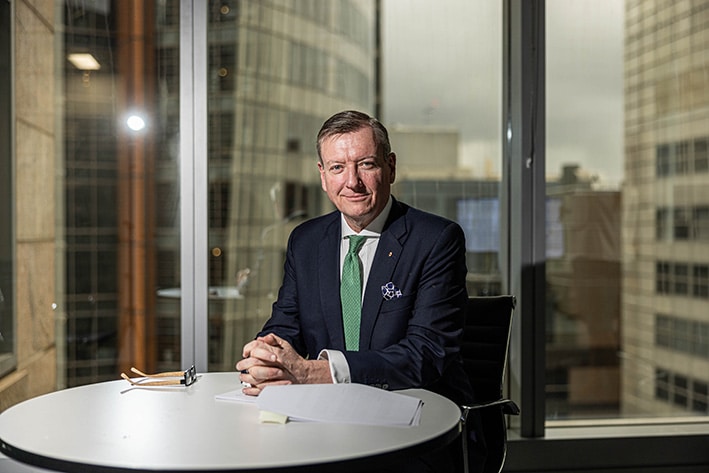
Record numbers at crisis point says former politician and suicide survivor John Brogden
Lifeline is receiving record numbers of calls from people in crisis, with an increase of about 46 per cent in the past two years.
On average, 3500 calls and texts are made every day to the service, up from the previous record of 2400 prior to COVID, the largest number in the charity’s 60 year history.
The cost of housing, for both home owners and renters, is being blamed for the huge number of people at crisis point, with interest rates again lifted this week, taking the official cash rate above 2 per cent for the first time in six years.
Demand is expected to rise even further. Borrowers who purchased at the height of the pandemic housing boom are struggling with higher mortgage repayments, while tenants are bearing the brunt of the hike with soaring rents and a lack of supply of properties.
While the numbers of people in crisis is confronting, President of Lifeline International and Patron of Lifeline Australia John Brogden said it also means people are reaching out for help with the stigma of mental health not as prevalent as it once was.
The former NSW Opposition Leader, who himself attempted to take his own life in 2005, said the staggering increase shows that while people are without doubt struggling, they feel less ashamed to ask for help.
He said eight Australians take their life every day, with 75 per cent of those men.
“We are currently seeing numbers like we’ve never seen before and by far the biggest number received by Lifeline in our 60-year history,” he said.
“However, these very high numbers are double-edged in that it shows there are a lot of people who are under pressure and experiencing crisis but at the same time they are calling us and not suffering in silence.
“I look at it in that within the bad news there is some good news.
“It is magnificent that people feel they can call us because for many years’ people didn’t think they could talk about mental health issues, it was very locked away and not spoken about.
“There’s no doubt normalising mental illness so that people can talk about it in the same way they might talk about having cancer, is so very important and one of my great objectives since leaving politics.
“We’ve never seen anything like this but it does demonstrate that people are listening to the message that we scream from the roof tops here at Lifeline which is ‘don’t suffer in silence, put your hand up and ask for help’.”
Mr Brogden said overwhelmingly, the high cost of housing is at the core of the huge increase of daily calls received by the crisis service.
He said Australia currently stands out for its enormous cost of housing internationally which is taking a huge toll on the community.
“From our perspective the cost of housing is almost the starting point with respect to all this pressure and that’s whether you own or rent,” he said.
“Price pressure when it comes to housing and rent flows over to the costs of energy/electricity and the cost of food.
“This is also being confirmed from our financial counselling services which shows people really are struggling.
“Home ownership remains the great Australian dream. My late grandmother, born in 1910 in Balmain and from a typical large Catholic family, always said her proudest achievement in life was owning her own home and I really think that remains the case but it’s getting harder and harder.”
Even in my darkest time when I tried to take my life and thought I was a burden, people wanted me to be around.” – John Brogden
Mr Brogden’s public fall from grace was also double-edged, in that it ended what could have been a very successful political career but due to his high profile also proved a turning point in the understanding of mental illness and depression in Australia.
His public life started when he became the Member for Pittwater in the NSW Parliament in 1996. In 2002, he was elected Leader of the Opposition on his 33rd birthday – the youngest person ever to lead a major political party at Federal or State level in Australia.
Two days after resigning as Opposition Leader following a night of poor behaviour at an event, the then 36-year-old was hospitalised after trying to kill himself in his electorate office in the Northern Beaches of Sydney.
Reflecting on his own very public mental health crisis, he says it started in childhood and something he will no doubt carry with him for the rest of his life.
He credits his family and faith with getting him through it, and today openly talks about his own mental health struggles. He’s determined to undo the common misconception that suicide remains a taboo subject.
“As difficult as the downfall was, in terms of the incredible intensity of public attention, the level of public sympathy and empathy afterwards was in greater proportion,” he said.
“What happened to me happens to people every day … I guess the difference is mine was very public.

“At the end of the day, you’re better to talk about it than not talk about it, and that by drawing it out you will almost certainly make it better.
“One thing it has taught me is that even in my darkest time when I tried to take my life and thought I was a burden on others, people wanted me to be around.
“My wife Lucy and children have grown to know the signs and I’m better at knowing how to deal with it myself.
“My faith has also played an important part in my life, one of the most comforting things for me was a few days after I tried to take my life was when a friend was able to get a priest to visit me in the mental health clinic while I was on suicide watch and gave me communion and heard my confession.
“My faith has been tremendously important to me and remains that way.”
Asked whether he’s surprised he’s still here, he pauses and says quite simply he is very content and appreciates his life more than ever.
“Looking back, I guess I would say I never thought my life could be this good,” he said. “I thought my suicide and depression would dominate my life in a negative way but it hasn’t.
“Today, I continue to see a psychiatrist on a regular basis and take medication, and probably will for the rest of my life. Although one thing is certain, I thank God every day that I am alive.”
Related:
ELECTION 2022: experts warn ‘inevitable fall’ in living standards
